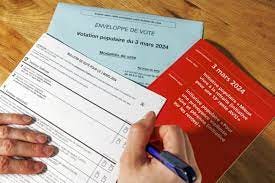

At my request, Henry Ferguson has kindly written this piece describing the most recent occasion, March 3rd, where the Swiss People exercised their Political Rights. I hope that you, like me, will find it illuminating and that it will help us to see how the sovereign Scottish People could one day exercise the same rights in an independent Scotland.
This past Sunday, 3rd March 2024, was one of Switzerland’s quarterly Direct Democracy days when the Swiss People vote on changes to the constitution they themselves have proposed. These are called Popular Initiatives and there were two on the national agenda:
· Both Government & Parliament recommended that the People reject the Trade Union sponsored initiative for a 13th monthly payment of the state pension (an increase of 8.3%). But the People had other ideas and accepted the initiative by the required double majority[1] (58.2% of the People & 15/23 of the Regions),
and
· The youth movement of the Centre & Centre-Right (government) parties sponsored an initiative to raise the retirement age from 65 to 66 but the People rejected that by a resounding 74.7% in all 23 regions.
With these two votes, the People have made it clear to the government and parliament that they’ve overlooked an inadequate state pension for far too long and that a retirement age of 65 – even considering higher life expectancy - was enough. The People have told government and parliament that they must fund the annual estimated cost of some GBP 4.5 billion either through additional pension contributions or VAT. It’s now up to the two of them to propose an acceptable solution to the People in a future DDD vote.
In another important vote, the People of the Canton where I live - the mountain Canton of Valais - trashed a proposed new constitution by a 71.5% majority. The proposal, prepared during nearly five years of voluntary work by a popularly elected Constitutional Assembly of 130 citizens (and adopted by a majority of 68.5% thereof) was rejected by a popular majority in every one of the 122 communes in Valais. As a result, the Valais region will continue with the existing 1907 constitution. Some of the ideas in the 2024 proposal might, in due course, be proposed as amendments to the old constitution.
The background
For the last decade, the Swiss trade union movement has been increasingly unhappy about the level of the state pension which no longer covers life’s basic necessities. The steadily increasing cost of living and rising health insurance premiums were the key drivers behind the unions’ proposal. It’s worth noting that during this period strike action was never considered. That’s because everyone in Switzerland, including unions, acknowledges that strikes are counter-productive.
In 2019, the association of Swiss trade unions, USS, nominated one of Switzerland’s most effective politicians, Pierre-Yves Maillard (PYM), as President. Using his political network, he successfully cultivated cross-party support for the current initiative. During his career holding leading roles in Lausanne and the Canton of Vaud, PYM was seen as someone who could forge compromise, a skill he demonstrated during the recent campaign. This was the first time the union movement sponsored a winning initiative on pensions.
Before the vote on the Valais constitution, there was widespread concern that the German-speaking minority in Valais weren’t sufficiently protected in cantonal government. This was probably the largest single factor underlying rejection of the proposed changes but it’s nevertheless interesting that ALL 122 communes, of whom the majority are in French Switzerland, rejected the proposal.
A knock-on effect?
Switzerland and the EU have agreed to reopen negotiations in 2024 on currently blocked bilateral deals on the electricity sector, salary protection and dispute resolution. The March 3rd display of People Power may strengthen the bargaining power of the Swiss negotiating team to get a deal that will be acceptable to the People. One thing is certain - once a new EU deal is finalised there will be a mandatory referendum where the Swiss People will have the final say.
The DDD process
In mid-February, I opened the envelope with my March 3rd voting materials. It contained two separate information brochures describing the national issues, two cantonal topics (the constitution plus a vote to change shop opening hours) and a one-page letter describing a municipal vote to change the approval process for remuneration of the Sion city executive. Every registered Swiss voter receives the same materials adapted to her or his canton and commune.
It took me ninety minutes to read each sides’ arguments on the votes concerned. I then completed the voting slips, marking “Yes” or “No” for each and used the pre-addressed envelope to seal each slip in its own colour-coded envelope for national, cantonal and municipal counting. Since we’re in Switzerland, I paid for the stamp. (By the way, Swiss Post, unlike the privatised Royal Mail, is state-owned.)
[For PDF copies of the federal and cantonal Popular Initiatives, translated into English, please direct message me in the chat and I’ll email them to you.]
[1] The Swiss system of Double Majority - a majority of both People and Cantons (Regions) - is what is often referred to as Decentralised Direct Democracy (DDD).




Thank you Leah and Henry.
I have been gathering information on the Swiss approach to democracy.
Independence is the ideal opportunity to change our democratic system, to make it, well, democratic. Indeed I think it a waste of opportunity to wait till independence.
I think most voters would view such a radical change to our democratic system as exciting, offering a real change on how the country is run. A Swiss style of consultation and local voting would lance the boil that I hear, "Ruled from Edinburgh or London, what difference would independence make to the Highlands/Islands?"
Recently HPMA's were a hot topic by us, as is the increase in wind turbines and their pylons, both feel like something being imposed. This results in people "manning the barricades," division rather than enlightened discourse and a positive move forward. The HPMA's have been booted into the long grass.
I brought up the possibility of having a wider discussion for a change in our democratic process with a politician. I was told, the fact that the HPMA's hadn't happened would indicate that the system as is works.
What that politician didn't see was that, yes, the same result would have happened under a direct system, but it would have been a decision made directly by the people that HPMA's affect. Leaving a feeling of inclusivity, positivity and not one of division.
A big positive I also see is that with a proper campaign, getting the idea out there, then bring it up in Westminster, who would, without a doubt, say no. Politics of grievance I know, but if it brings more to yes.
Another idea that more voters would get behind, think potholes, that Westminster would be likely to refuse is a portion of the fuel duty from the local area goes back to that area directly. Although this is pertinent to our area, bad roads, heavy tourist and through traffic.
Thanks again for your time.
Please Henry, can you send me a PDF to my email.
Can you pick up my email from the substack acc?